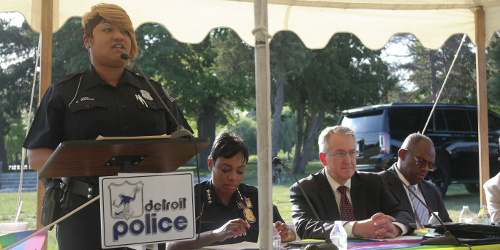BY AJ TRAGER

The 2nd Annual LGBT Community Chat took place in Palmer Park Aug. 3. LGBT Liaison to the Detroit Police Department, Dani Woods, addresses the crowd of over 100 attendees. BTL Photo: AJ Trager
DETROIT – Metro Detroit community members and the Detroit Police Department met Aug. 3 in Palmer Park for the 2nd Annual LGBT Community Chat "Breaking Down Barriers," facilitated by DPD LGBT Liaison Dani Woods.
More than 100 passionate attendees gathered for a discussion with high-ranking officials in the DPD, to discuss the current climate between the LGBT community and the DPD, and how the two can better support each other moving forward.
Last year's inaugural event was significantly more heated, following multiple homicides of transgender and gender non-conforming Detroiters. Woods works directly between the two communities to ensure that LGBT people in Detroit are more comfortable coming to law enforcement in the event of danger or as a victim of a hate crime, but she has faced significant challenges.
Affirmations Program Services Director and DPD LGBT Advisory Board member Lilianna Angel Reyes reflected some of the challenges. "One year ago I was here. Like my sister Julisa, I was on the panel but I had no affiliation with any police ever. I'm still a little nervous about police officers, but the really great thing a year later is that not only myself, but Affirmations, has been able to work with the DPD."
Last year's event motivated DPD Chief James Craig to create the board made up of members of the community and advocates. This is to ensure concerns are heard by the police department. The board has developed ways to better the relationship between the LGBT community and law enforcement. Woods chairs the board which, a year later, consists of many LGBT community members including panelists Rhiannon Chester, community advocate; Reyes; and Trans Outreach Coordinator for Fair Michigan Justice Project Julisa Abad.
The board is tasked with more than just "fight crimes and having people talk about crimes," Reyes said. They are also responsible for community outreach. Reyes said she believes it is extremely important to have an "out" police officer on the force so that LGBT youth, especially, feel comfortable going to the DPD for help.
Reyes and Chester agreed the board is a successful result of last year's conversation.
"I really appreciate the intentionality of the DPD to hear us. I think that the first way that we heal from the things that happen to us or the traumas that we have in regards to our relationship with the police, is to start with a conversation. So last year we started with a conversation very much like this one and we're back to continue that conversation," Chester said.
Cynthia Pittman traveled from Puerto Rico to attend the event. Her mother, Susan Pittman and her mother's partner, Christine Puckett, were both murdered in their Huron Township home by their neighbor in 1992. Both women, whom Pittman is writing a memoir about, were active members of the LGBT community. The Pittman-Puckett Art Gallery was named in their honor by Affirmations, for which the couple served on the board of directors together.
"When they contacted the police about being threatened, the police said that something had to be done first before they could respond. So the neighbor came over to the yard…" Pittmann said recounting her mother's last day. Shortly after that phone call, the neighbor violently murdered both women.
"Is there a better way to handle this now? What's in place?" she asked the panel.
"Times have surely changed," Woods said. "We take even threats to the highest degree of sincerity. We don't count anyone short."
Many studies confirm that members of the LGBT community are more likely than their heterosexual counterparts to be victimized because of their identity and are less likely to report an incident to the police.
Detroit Police 1st Assistant Chief LaShina Stair said that the DPD is committed to providing the safest environment for all residents in Detroit, especially the LGBT community, but said that they can't do it alone. She stressed a need for a collaborative effort.
Director of Law and Policy at the Michigan Department of Civil Rights, attorney Daniel Levy, agreed with Stair and said that in order to provide protections or litigation for LGBT Detroiters, they first need to speak up and come to the police for help. He said that the MDCR wants to try cases of hate crimes against the LGBT community, but that MDCR "can't make those cases come to us. We can't bring those cases to us."










